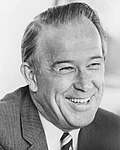
The 2002 United States Senate elections featured a series of fiercely contested elections that resulted in a victory for the Republican Party, which gained two seats and thus a narrow majority from the Democratic Party in the United States Senate. The Senate seats up for election, known as class 2 Senate seats, were last up for regular election in 1996. The election cycle was held on November 5, 2002, almost 14 months after the September 11, 2001, attacks.

The 1986 United States Senate elections were elections for the United States Senate. Held on November 4, in the middle of Ronald Reagan's second presidential term, the 34 seats of Class 3 were contested in regular elections. The Republicans had to defend an unusually large number of freshman Senate incumbents who had been elected on President Ronald Reagan's coattails in 1980. Democrats won a net of eight seats, defeating seven freshman incumbents, picking up two Republican-held open seats, and regaining control of the Senate for the first time since January 1981. This remains the most recent midterm election cycle in which the sitting president's party suffered net losses while still flipping a Senate seat.

The 1982 United States Senate elections were held on November 2, 1982. They were elections for the United States Senate following Republican gains in 1980. The 33 Senate seats of Class 1 were up for election in 1982. A total of four seats changed hands between parties, with Democrats winning seats in New Jersey and New Mexico, and Republicans taking seats in Nevada and the seat of the lone independent, Senator Harry Byrd Jr., in Virginia. Democrats made a net gain of one seat bringing them to 46 seats, while Republicans stayed at 54 seats for a majority. However, the Democratic gain in New Jersey replaced a Republican that had been appointed earlier in the year. Liberal Republicans senators in Connecticut, Rhode Island and Vermont held onto their seats, keeping the Senate in Republican hands.

The 2002 United States Senate election in Alabama was held on November 5, 2002. Incumbent Republican U.S. Senator Jeff Sessions won re-election to a second term. Sessions became the first Republican to be elected to two full terms to the Senate from the state. As of 2022, this is the most recent Senate election in Alabama in which Colbert and Lawrence counties voted for the Democratic candidate.
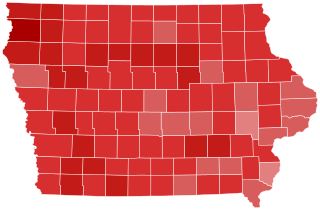
The 2004 United States Senate election in Iowa was held on November 2, 2004. Incumbent Republican United States Senator Chuck Grassley ran for re-election to a fifth term in the United States Senate. Grassley and former State Senator Arthur A. Small won the Republican and Democratic primaries, respectively, unopposed, and faced each other in the general election. Though this election coincided with the highly competitive presidential election, Grassley was not considered vulnerable and defeated Small in a landslide.

The 1966 United States Senate election in Illinois took place on November 8, 1966. Incumbent Democratic United States Senator Paul Douglas, seeking a fourth term in the United States Senate, faced off against Republican Charles H. Percy, a businessman and the 1964 Republican nominee for Governor of Illinois. A competitive election ensued, featuring campaign appearances by former vice president Richard M. Nixon on behalf of Percy. Ultimately, Percy ended up defeating Senator Douglas by a fairly wide margin, allowing him to win what would be the first of three terms in the Senate.

The 1983 United States Senate special election in Washington was a special election held to fill the seat which had been held by longtime Senator Henry Jackson, who unexpectedly died on September 1. Three-term former Governor Dan Evans was appointed by Governor John Spellman on September 8, and he won the special election over congressman Mike Lowry on November 8. Jackson had won a sixth term the previous year, so more than five years remained in the term.
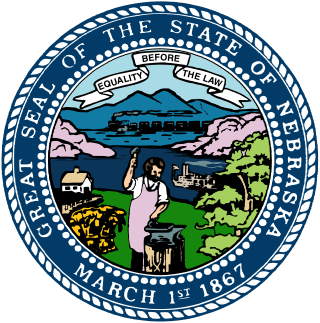
The 1934 United States Senate election in Nebraska took place on November 6, 1934. A special election was held on the same day for the same seat. The incumbent Senator, Republican Robert B. Howell, died on March 11, 1933. William Henry Thompson, a Democratic politician, was appointed to the vacant seat. Richard C. Hunter was elected to finish Howell's term, while Burke was elected to the next term, defeating Robert G. Simmons. This was the last time until 1976 that a Democrat won a Senate election in Nebraska.

The 1996 United States House of Representatives elections in Texas occurred on November 5, 1996, to elect the members of the state of Texas's delegation to the United States House of Representatives. Texas had thirty seats in the House, apportioned according to the 1990 United States census.

The 1822–23 United States Senate elections were held on various dates in various states. As these U.S. Senate elections were before the ratification of the Seventeenth Amendment in 1913, senators were chosen by state legislatures. Senators were elected over a wide range of time throughout 1822 and 1823, and a seat may have been filled months late or remained vacant due to legislative deadlock. In these elections, terms were up for the senators in Class 2.
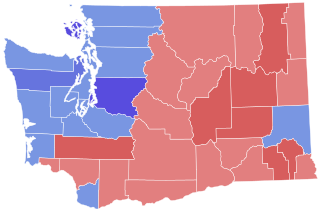
The 2016 United States Senate election in Washington was held November 8, 2016, to elect a member of the United States Senate to represent the State of Washington. Incumbent Democratic Senator Patty Murray ran for re-election to a fifth term, and won by a significant margin, winning 59% of the vote, to Republican Chris Vance's 41%.

The 2018 United States Senate election in Washington took place on November 6, 2018, to elect a member of the United States Senate to represent the State of Washington. Incumbent Democrat Maria Cantwell won election to a fourth term over television news journalist Susan Hutchison, a Republican.

The 1930 United States Senate election in Nebraska took place on November 4, 1930. The incumbent Republican, George W. Norris, was re-elected to a fourth term. He defeated Gilbert Hitchcock, the former Senator for the Class 1 seat. The anti-Norris Republican Beatrice Fenton Craig ran by petition.

The United States Senate election in Illinois of 1954 took place on November 2, 1954. Incumbent Democratic United States Senator Paul Douglas was reelected to a second term.

Two special elections in Nebraska were held on November 2, 1954, alongside a regular election. The Class I election was to finish Hugh A. Butler's term, with Samuel W. Reynolds appointed to the vacancy on July 3, 1954. The Class II election was to finish Kenneth S. Wherry's term, with Eva Bowring as incumbent at the time of the election. Both seats were held by Republicans, with Roman Hruska winning the Class I election and Hazel Abel winning the Class II election.
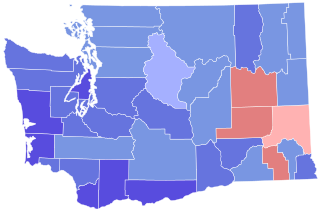
The 1974 United States Senate election in Washington was held on November 5, 1974. Incumbent Democratic U.S. Senator Warren Magnuson won a sixth term in office, defeating Republican state senator Jack Metcalf, in a rematch of the previous election.

The 2022 United States Senate election in Washington was held on November 8, 2022, to elect a member of the United States Senate to represent the state of Washington. Incumbent senator Patty Murray was first elected in 1992 with 54% of the vote to succeed retiring fellow Democrat Brock Adams. Murray won re-election to a fifth term in 2016 with 59% of the vote.

The 2022 United States Senate election in Oregon was held on November 8, 2022, to elect a member of the United States Senate to represent the state of Oregon. Incumbent Democratic U.S. Senator Ron Wyden, who was first elected in a 1996 special election, ran for a fifth full term. Jo Rae Perkins, who unsuccessfully ran for Oregon's other Senate seat in 2020, won the Republican primary with 33.3% of the vote. The four candidates filing with the Oregon Secretary of State for this election included Chris Henry of the Oregon Progressive Party and Dan Pulju of the Pacific Green Party.

Several elections took place in the U.S. state of Georgia in 2022. The general election was held on November 8, 2022. A runoff election for one of Georgia's seats in the United States Senate was held on December 6, 2022. The runoff was scheduled because none of the candidates for Senate received 50% of the statewide vote in the general election. In addition to the Senate seat, all of Georgia's seats in the United States House of Representatives were up for election. Also up for election were all of Georgia's executive officers and legislative seats, as well as one seat on the Georgia Public Service Commission. The Republican Party decisively won every single statewide office in Georgia except for the Federal Senate race which narrowly went Democratic in 2022.

The 2022 Washington Secretary of State special election was held on November 8, 2022. Incumbent Kim Wyman, a Republican, resigned from the office on November 19, 2021, to become the senior election security lead for the Cybersecurity and Infrastructure Security Agency in the Biden administration's Department of Homeland Security. Washington governor Jay Inslee, a Democrat, announced he would appoint state senator Steve Hobbs as her replacement, the first Democrat to hold the office in more than fifty years.


